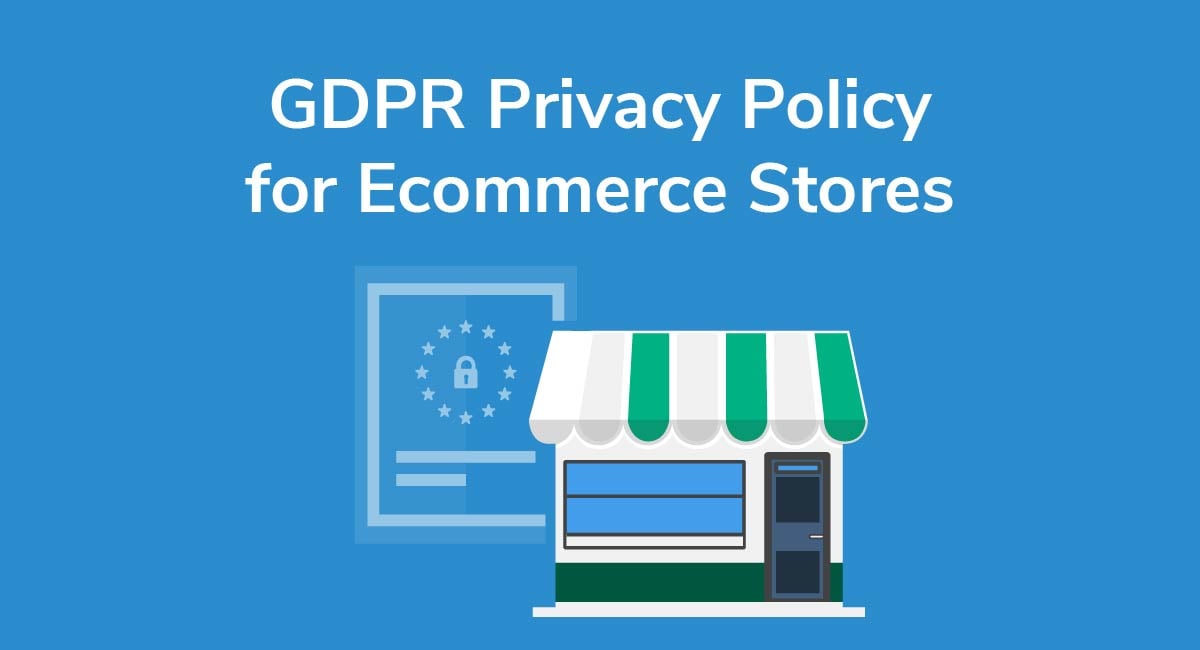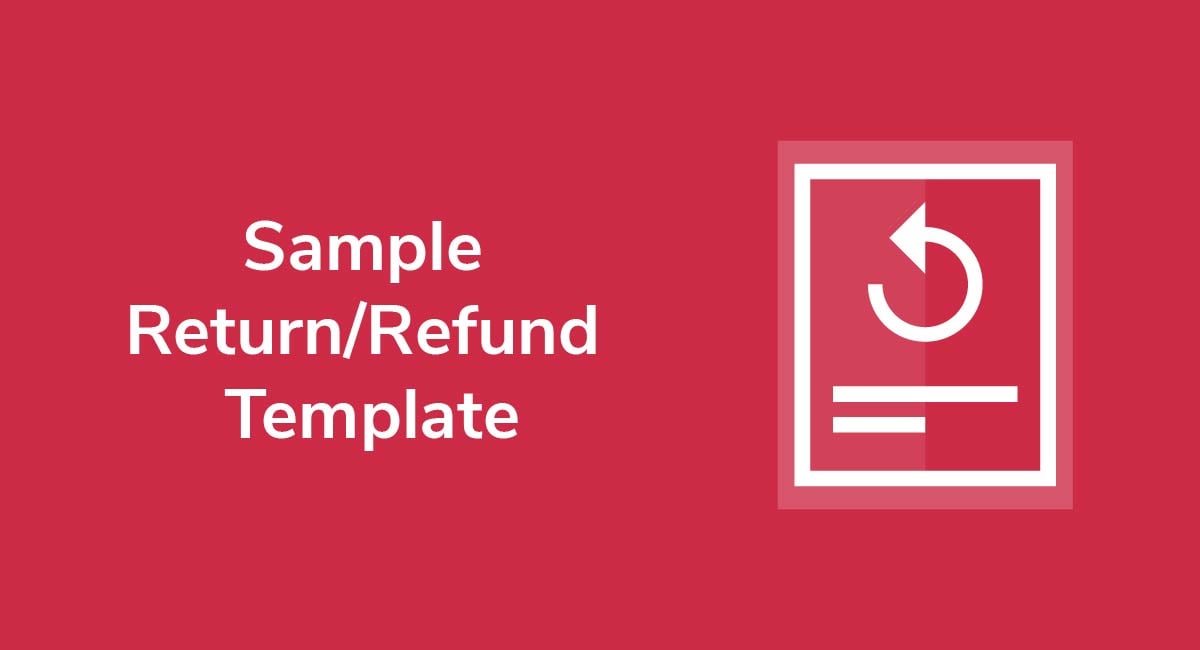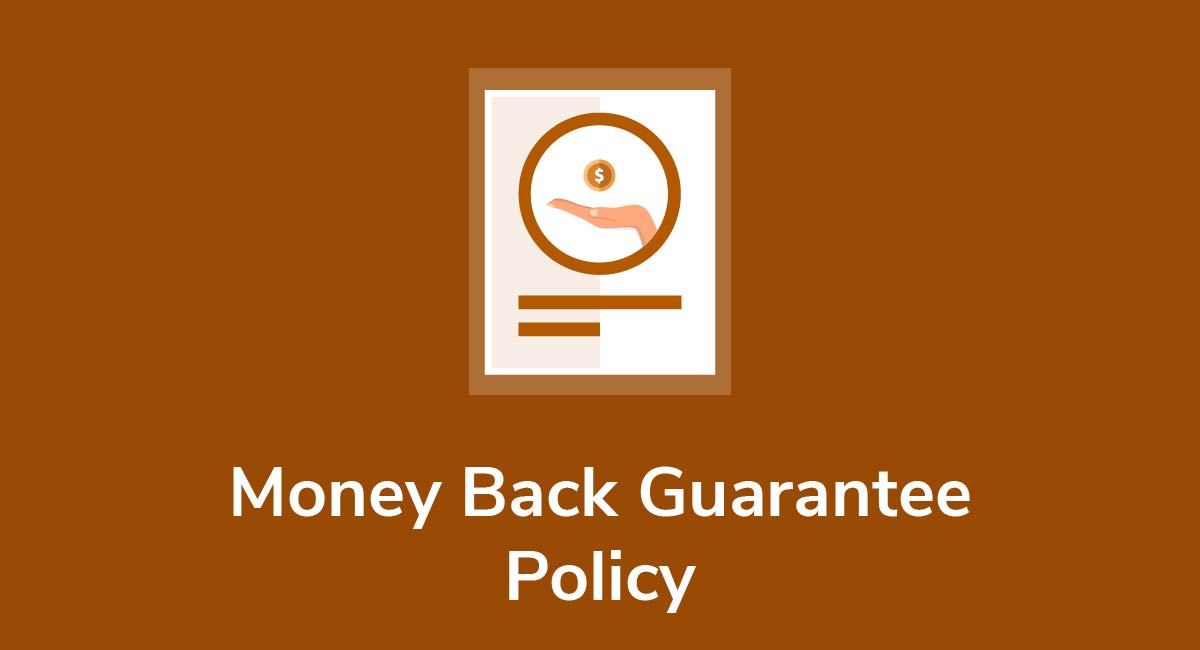Disclaimers for Ecommerce Stores
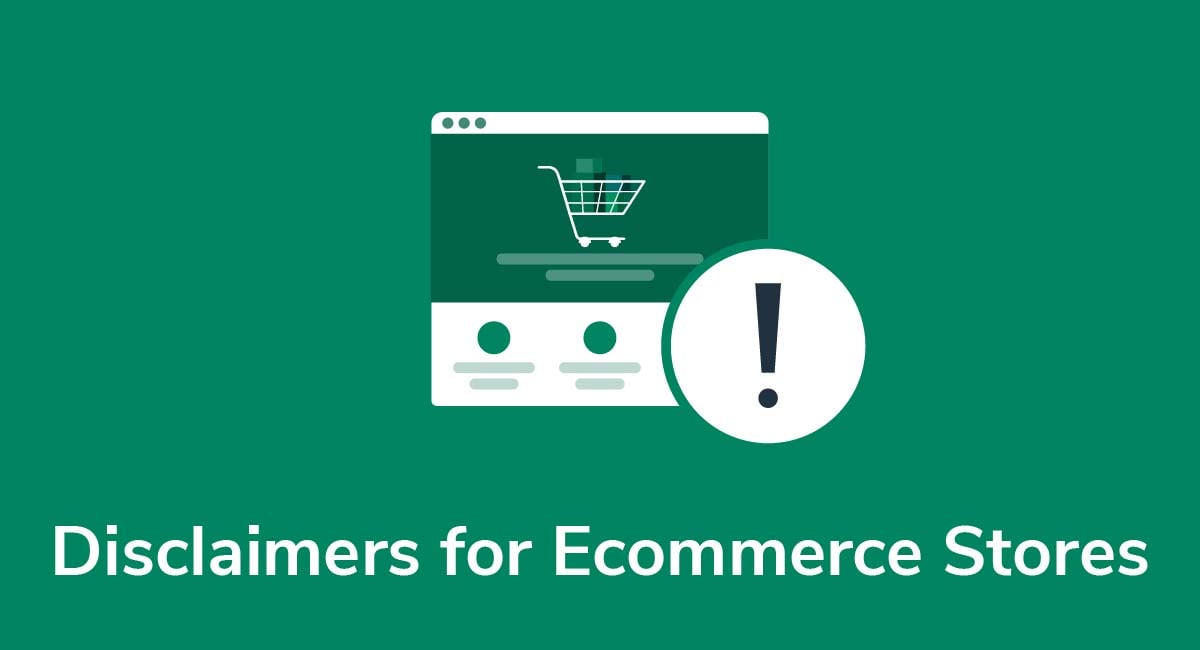
Ecommerce business owners, like all business owners, strive to maximize profits while minimizing risk and liability. That's where disclaimers come in and can provide abundant protections.
In this article, we'll look at examples of different disclaimers you may need for your ecommerce store. We'll also show you how to create your own and where to display them so your customers can find them easily.
Get compliant today with PrivacyPolicies.com
Select one of our generators to create the required legal agreements for your business:
- Our Privacy Policy Generator can help you generate a customized Privacy Policy in around three minutes, for free.
- Our Terms & Conditions Generator can help you generate a customized Terms & Conditions agreement in around three minutes, for free.
- Our EULA Generator can create a customized End-User License Agreement for your mobile or desktop app.
- Our Cookies Policy Generator can create a customized Cookies Policy to help your compliance with ePrivacy Directive and GDPR.
- Our Disclaimer Generator can create a disclaimer or disclosure for your website.
- Our Return & Refund Policy Generator can help your ecommerce store by creating a returns or refunds policy.
Integrate a free Cookies Notice and Cookie Consent banner to comply with the EU ePrivacy Directive and the new GDPR law regarding cookies.
- 1. What are Disclaimers for Ecommerce Stores?
- 2. Are Disclaimers Legally Required?
- 3. Why are Disclaimers for Ecommerce Stores So Important?
- 4. What Disclaimers are Commonly Used with Ecommerce Stores
- 4.1. Disclaimer of Warranties and Limitation of Liability
- 4.2. Affiliate Link Disclaimer
- 4.3. Errors and Omissions Disclaimer
- 4.4. No Professional Advice (No Professional Relationship) Disclaimer
- 4.5. User-Generated Content Disclaimer
- 5. Where to Display Disclaimers for Ecommerce Stores
- 5.1. Website Footer
- 5.2. Within a Terms and Conditions Agreement
- 5.3. Near the Relevant Product or Content
- 6. Summary
What are Disclaimers for Ecommerce Stores?
Disclaimers for ecommerce stores are statements designed to help protect you and your business from liability issues that arise when users visit your site or purchase your products or services.
Disclaimers specifically disclaim responsibility for a variety of damages, both real and perceived.
A good example of this would be an online vitamin seller that uses a disclaimer to let users know that the information provided on its website doesn't constitute professional medical advice. (This type of disclaimer is often referred to as a no professional advice, or a no professional relationship disclaimer.)
In addition, ecommerce store owners often use disclaimers to inform users that they're not responsible for content posted by third-parties. Third party disclaimers are particularly important if your ecommerce site allows customers to leave reviews, chat in forums, or post general content. If so, you should make it clear that such material may be inaccurate or offensive, and that you bare no responsibility if it is.
Since no two ecommerce stores are exactly alike, you'll need to decide which disclaimers apply to your business. Whichever you choose to include, it's important to make sure that they're clearly written, easy to find, and that they adequately address the risks that apply to you, your business, and your users.
Are Disclaimers Legally Required?

Most disclaimers aren't legally required.
However, if you engage in affiliate marketing, the Federal Trade Commission (FTC) requires you to use an affiliate disclaimer to let users know if you're getting paid to promote a product or service, or if you get a commission when someone makes a purchase after following one of your links.
But just because most disclaimers aren't legally required, it's still wise to have them to ensure maximum protection.
That said, disclaimers won't help if you engage in illegal, dishonest, or deceptive behavior. For example, you can't hide behind an Errors and Omissions disclaimer if you knowingly publish inaccurate material or make claims that you know aren't true.
Why are Disclaimers for Ecommerce Stores So Important?

Without disclaimers specifically tailored to your business, your ecommerce site could be a liability instead of a steady source of revenue.
To recap, disclaimers for ecommerce stores are vital because they allow you to disclaim responsibility and avoid liability for damages that may result when customers visit your website or buy a product or service online.
Additionally, disclaimers for ecommerce stores can:
- Promote clarity and transparency
- Help you establish or protect your reputation
- Build trust between you and your customers
- Facilitate the buying process
- Show potential customers that your practices are inline with industry standards and those of your competitors
- Warn users about the risks associated with using your website, products, and services
In addition, disclaimers may discourage customers from taking legal action if they're unsatisfied with a purchase or feel they've been harmed in some way. After all, if your disclaimers are easy to find, easy to understand, and adequately disclaim your liability in various situations, it should be clear that legal action would be an exercise in futility.
It's also worth noting that disclaimers can only minimize risk, but they can't protect your ecommerce store from all liability.
What Disclaimers are Commonly Used with Ecommerce Stores

The following disclaimers are commonly used by owners of online shops and ecommerce sites, and they may be relevant to your business, too.
Disclaimer of Warranties and Limitation of Liability
A disclaimer of warranties can protect your ecommerce store against legal action and financial claims if you sell faulty products or services or distribute inaccurate or incomplete information. And a limitation of liability disclaimer will help limit your liability in the case of legal issues.
But even if you sell top-notch merchandise and are a stickler for details, you should still use a disclaimer of warranties to let users know that they use your site at their own risk, and that web content, products, and services are provided "as is."
While some disclaimers for warranties address web content only, others cover what is and isn't covered when a customer has a post-purchase issue with a product or a service.
Here's an example from Tackle Warehouse that references the company's website, products, and services:
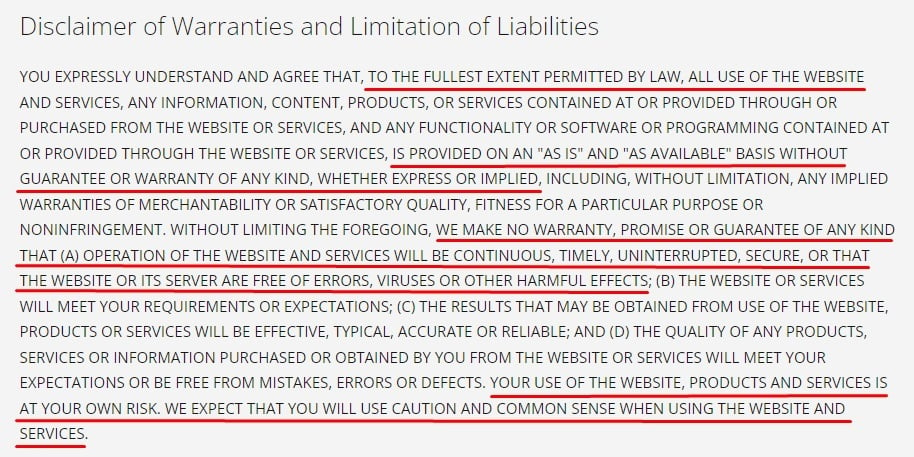
In this example from Dewalt, the company clearly differentiates between its website and products:

Whereas a disclaimer of warranties should address what your business does and doesn't promise, a limitation of liability should cover your business's responsibilities and warn users that your liability is limited to the fullest extent of the law when they use your website or ecommerce store.
Here's an example from Fishermanshub:
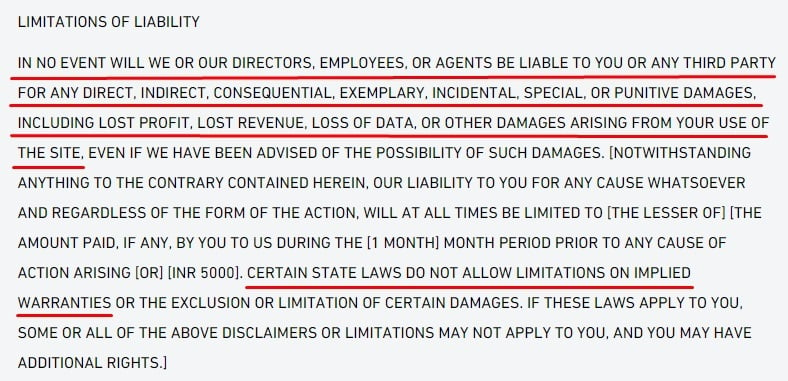
In addition to establishing the limits of its liability, Fishermanshub also lets users know that the laws of some states impose restrictions on Limitations of Liability and that customers who reside in those states may have additional rights.
Affiliate Link Disclaimer
An affiliate link disclaimer informs users that you're getting paid to promote a product or service, and that you'll get a commission when someone makes a purchase after following a link provided on your website.
The FTC requires affiliate link disclaimers because conflict of interest claims can arise when you earn a commission by recommending another company's products or services.
In addition to being a legal requirement, clearly disclosing your affiliate relationships can promote trust and lead to higher sales and increased revenue for you and your partners.
Here's an example of this type of disclaimer:
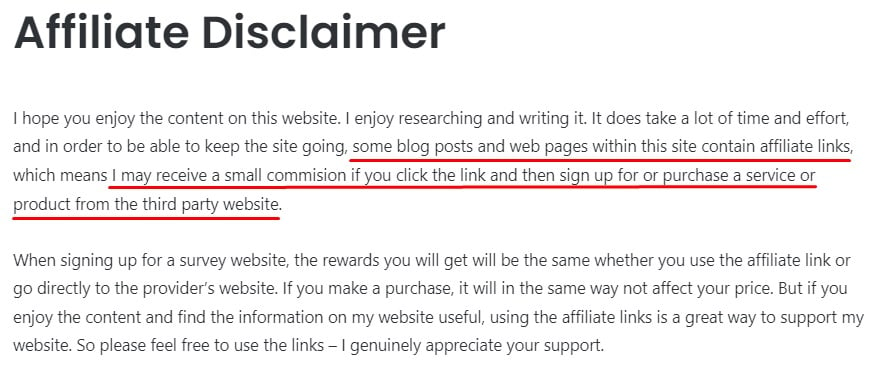
Errors and Omissions Disclaimer
Because few websites, mobile apps, and ecommerce sites are totally complete and error free, it's important to let users know that your site may contain incorrect information, and that some may be missing altogether.
By including an errors and omissions disclaimer, you'll cover yourself by stating that you don't guarantee that the information is complete and accurate, and that you aren't responsible if it's not.
Here's how Cabelas addresses this in an Errors, Inaccuracies, and Omissions clause:

In the first sentence, Cabela's informs users that the disclaimer covers product information found on its website, and in its catalogs, circulars, and stores.
No Professional Advice (No Professional Relationship) Disclaimer
Some ecommerce sites provide information that some users may mistake for legitimate professional advice.
This is particularly true with websites and ecommerce stores that publish material and sell products and services in the health, wellness, and finance niches.
However, a no professional advice disclaimer could also come in handy if you for example run an online plumbing supply house and occasionally post "how to" articles on your blog or website.
If so, it's important to let users know that:
- Your content is for informational purposes only
- You're not providing professional advice
- No professional relationship exists
If you run a health and medical ecommerce site, you should also make it clear that the information you post isn't meant to treat, diagnose or mitigate any disease or condition, and that it doesn't take the place of a consultation with a legitimate healthcare professional.
Here's how A1 Supplements covers these things:

Likewise, if you run a financial, stock market, or commodities related ecommerce store, you should inform users that the information you, your guests, and partners post shouldn't be mistaken for investment advice.
Here's how U.S. News & World Report addresses professional advice:

User-Generated Content Disclaimer
Some ecommerce sites allow users to leave product reviews and post questions and comments on forums where customers can interact with one another.
If you run an ecommerce site, it's a good idea to let users know that you're not responsible for user-generated content posted in these and other areas.
Here's how Kitco addresses third-party and user generated content:

Remember, you may not need all of these disclaimers. Pick and choose the ones that will be useful and relevant to your specific ecommerce store.
Where to Display Disclaimers for Ecommerce Stores

Disclaimers for ecommerce stores can be displayed in a number of areas, but it's best to put them where your users can find them with minimal effort.
Here are a few examples of where many ecommerce stores place disclaimers.
Website Footer
Placing links to your disclaimer page within your website's footer is a great choice because most users know to look for important information there.
In this example, GoldPrice.org includes a disclaimer link on its website footer:

Because disclaimers and other disclosures are particularly important to some ecommerce sites, they may also be linked to at the top of a web page where users are more likely to see them.
If you have a relatively short disclaimer, you can also include it in its entirety as the top or bottom of your website.
In the following example, Bankrate discloses its affiliate relationships at the bottom of its website in a section titled How We Make Money:
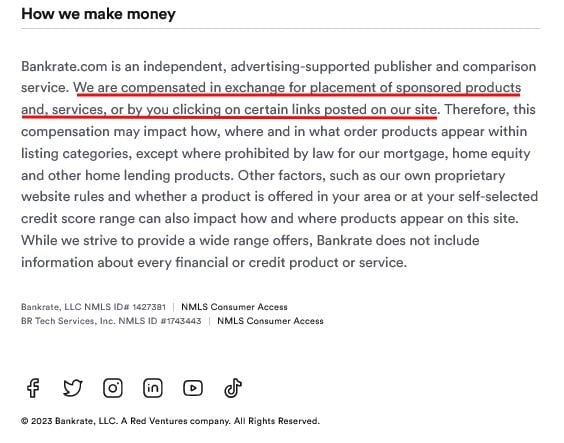
Within a Terms and Conditions Agreement
Many ecommerce store owners place disclaimers within their general Terms and Conditions agreement.
This is a popular and effective method because most users know to look in Terms and Conditions agreements for this type of important information.
Here's an example of a disclaimers clause in a Terms agreement:

However, Terms and Conditions agreements aren't legally required. Most ecommerce stores have them, but if not, you can place your disclaimers in other areas instead. If your ecommerce store does have a Terms and Conditions agreement that includes disclaimers, you can also place them in the following areas to ensure maximum visibility.
Near the Relevant Product or Content
If you sell a variety of products and some disclaimers are more relevant to them than other products, you can consider including the disclaimers right on the product page itself.
For example, if you sell some health supplements, you can include a disclaimer that you aren't giving medical advice or creating a professional relationship with the customer when the item is purchased.
Your affiliate link disclaimers actually legally need to be placed near where the affiliate links themselves are, such as at the top of the product page or blog post where the link is posted.
Summary
Disclaimers are legal statements that provide abundant protections for businesses of all types.
Because a number of specific disclaimers apply to ecommerce stores, most website and ecommerce store operators use multiple disclaimers to cover all their bases.
Many ecommerce stores use the following disclaimers:
- Disclaimer of warranties
- Affiliate link disclosure
- Errors and omissions
- No professional advice (no professional relationship)
- Limitations of liability
- User-generated content
- Confidentiality
Once you've created all the necessary disclaimers, be sure to place links in areas where most customers know to look for them, like on the footer of your website.
